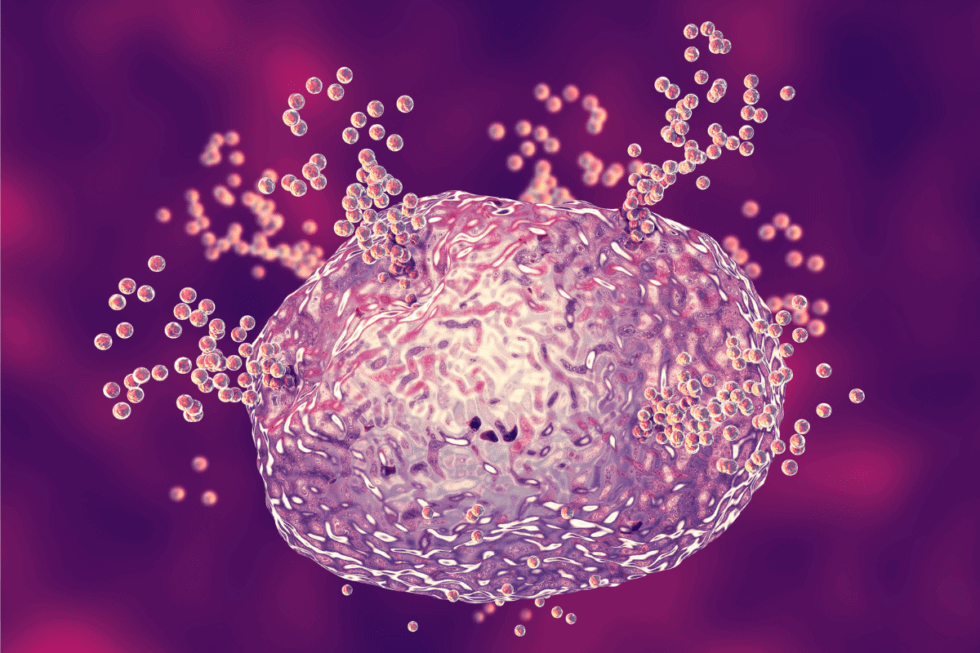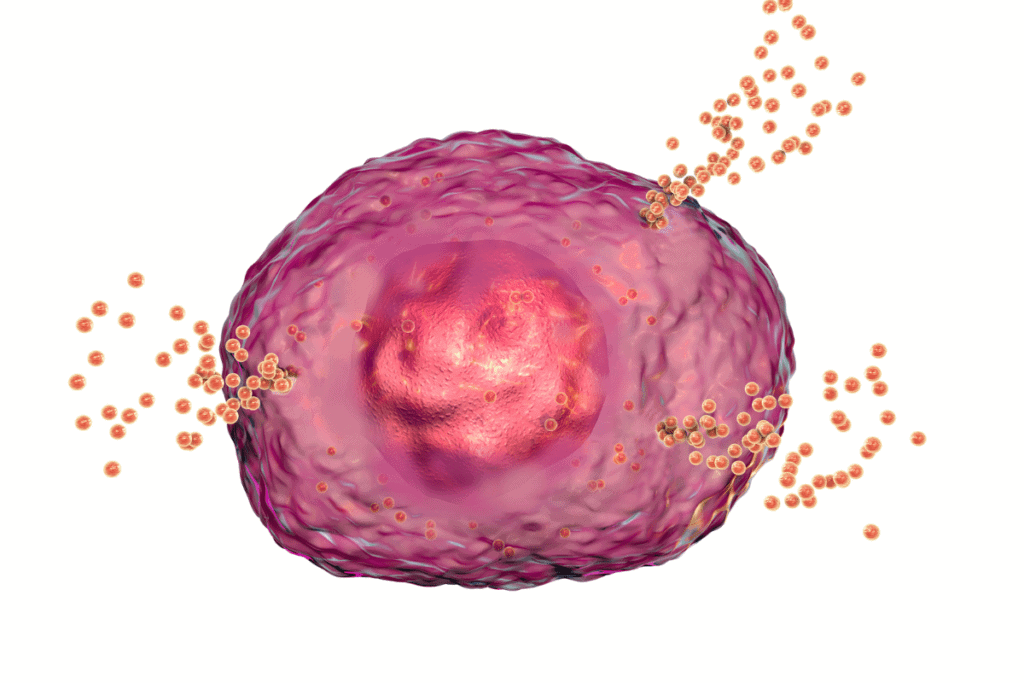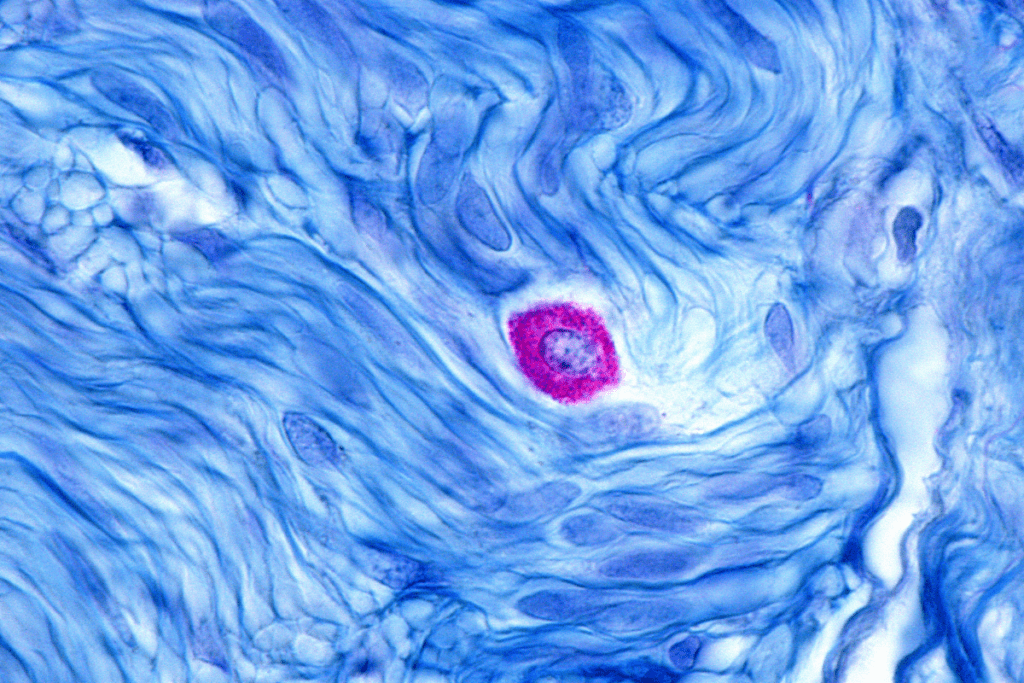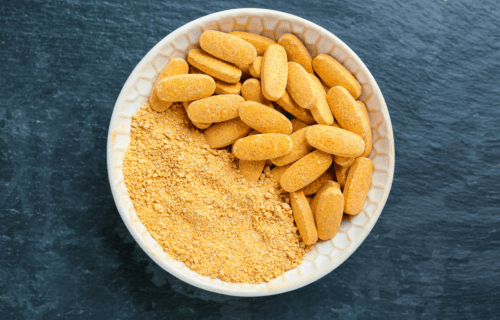
Can Mast Cell Activation Syndrome Go Away?
There are many possible symptoms to Mast Cell Activation Syndrome. Does laundry detergent make your skin itch? Does perfume cause your chest to tighten up? Do certain foods leave you covered in red, itchy hives? Do you have a lot of unexplained symptoms that doctors can’t seem to figure out?
Do you have any of these common Mast Cell Activation Syndrome Symptoms?
As little as 3 years ago the only word we had for people like us was “sensitive.” Today we know that many people who have been called “sensitive” are actually dealing with a condition called Mast Cell Activation Syndrome.
Those of us with MCAS are now often called the canaries in the coal mine.
This is because miners would take canaries into the coal mine with them. The canaries were very sensitive to carbon monoxide in the coal mines. When the canaries got sick, it warned the miners of toxic danger in the mine.
Those of us that are the “canaries” can have reactions to things like pesticides, perfumes, junk foods, pollution, and inflammatory triggers that may take other people years to react to.
These chemicals are hurting all of us. But when you have Mast Cell Activation Syndrome, the ill effects catch up to you much more quickly.
I know because I have MCAS, too, and I’ve made it my life’s work to help others with this condition.
Mast Cell Activation Syndrome (MCAS) was only officially listed as a medical diagnosis in 2016. It was once considered rare.
But now lead MCAS researcher Dr. Afrin says that it affects 14%-17% of the general population. And it is likely highly underdiagnosed.
Some people with MCAS have genetic weaknesses that set the stage for illness. Others get MCAS after an infection, like Lyme, or after mold exposure.
However we get it, MCAS is on the rise.
Whether you’ve recently been diagnosed with MCAS or are trying to find an answer to a lifetime of “sensitivity”, this guide is for you.
You’ll find out:
- What is MCAS and what are mast cells?
- What are the most common symptoms of MCAS?
- How is MCAS diagnosed?
- Can mast cell activation syndrome go away?
- What is the difference between Mast Cell Activation Syndrome and Mastocytosis?
- What should you do if you suspect you might have MCAS?
What Are Mast Cells??

Mast Cell Activation Syndrome is caused when the mast cells become over-responsive. But to understand why MCAS happens, we have to understand the mast cells, first.
Mast cells are a type of white blood cell that play an important role in regulating the immune system. Mast cells are found in almost all tissues in the body – in the skin, gut lining, lung lining, lining of the bladder, blood vessels, nerves, tendons, ligaments, bones, and even the brain.
They are also found in the mouth, eyes, and ears. They are an important part of allergic responses (which isn’t always a bad thing!), wound healing, and maintaining the blood-brain barrier function.
You can think of mast cells like the guards of the body. They protect our bodies from invaders. When there is a perceived threat from a virus, bacteria, parasite, or an allergen, the mast cells are activated to release chemicals throughout the body.
There are over 200 different chemicals that can be released from mast cells. These chemicals are held in little granules inside the mast cells. When mast cell activation occurs, the mast cells release these inflammatory molecules into the body. This is done to get rid of a pathogen or allergen.
This process is called degranulation.
The most famous of the mast cell chemicals is histamine, which causes swelling, redness, and itching. You may have noticed these symptoms when you get a cut that becomes infected or an insect bite.
There are many other chemicals as well that are released by mast cells, too. Some you may have heard of include prostaglandins, leukotrienes, tryptase, cytokines, and reactive oxygen species. These are all involved in creating and managing inflammation in the body.
How Mast Cells Lead To Mast Cell Activation Syndrome (MCAS)

When mast cells perceive a threat to the body, they degranulate to release chemicals to protect our bodies.
The chemicals released by the mast cells also call other immune cells to come to areas of the body where they are needed.
The mast cells are like the first responders, calling in other immune cells for backup. This is all a good thing because we need our immunes systems to protect us.
Mast Cell Activation Syndrome occurs when the mast cells stop responding to threats as they should and start to over-react.
And once mast cell reactions get out of control in someone with Mast Cell Activation Syndrome, it triggers the other mast cells to keep responding and degranulating.
This starts an inflammatory cascade like a forest fire that starts with a little spark and eventually burns out of control.
The causes of MCAS are different for everyone, but there are some common triggers:
- Certain foods
- Chemicals (such as perfumes, cleaning products, and pollutants)
- Infections
- Hormone imbalances
- Temperature extremes
- Lack of sleep
- Alcohol
- Surgery
- Injuries
- Heavy metal toxicity
- Stress
Symptoms of Mast Cell Activation Syndrome (MCAS)

MCAS symptoms can occur many different systems in the body. I like to break these symptoms down into the larger, macro body systems and then into the smaller, micro systems.
You don’t have to remember all of these symptoms. This is just a map for you to look at if you have a lot of different symptoms and no doctor can figure out what is wrong.
So as you read this, pay attention to whether you have symptoms in multiple systems. If so, you might want to talk to your doctor about MCAS.
General Symptoms:
Mast cells are in most tissues of the body, so MCAS can affect almost every body system. Many people with MCAS have a general sense of overall fatigue and feeling bad.
MCAS patients frequently have multiple food, drug, environmental, and chemical sensitivities. They may also have chills, sweats, and a sense of being cold all the time. Generalized inflammation and swelling are also common in MCAS.
Muscles/Skeleton:
Mast cells are prevalent in the muscles and bones. Most people with MCAS complain of general muscular and bone pain and a feeling of arthritis that moves around.
They may have been diagnosed with fibromyalgia. Hyperflexible joints are common in MCAS, causing joint pain and instability. MCAS can sometimes cause osteoporosis and osteopenia, even in young people. Degenerative disk issues can also arise due to MCAS.
Skin:
There are numerous mast cells in the skin. Flushing, itching, and burning sensations frequently occur for people with MCAS. Some people even get hives. Lots of us with MCAS have a ruddy or reddish complexion on the checks.
Other skin symptoms include easy bruising, psoriasis, eczema, rosacea, and slow healing of the skin. Some people experience hair loss. Dermatographia (persistent redness or white marks after scratching skin) is also quite common.
Heart:
Mast cells reside in the heart too. Patients with MCAS often complain of feeling faint or even fainting. They may have chest pains, fast heartbeat, and heart palpitations that are not heart attack related. Dizziness and lightheadedness when standing up and low blood pressure are common as well.
Digestion:
The entire GI tract is lined with mast cells. So diarrhea, constipation, cramping, abdominal pain, nausea, and vomiting can occur. Reflux is common, especially after eating high histamine foods. Some people have a really hard time with mouth burning.
Trouble swallowing and throat tightness can occur. People with MCAS may also have malabsorption, bloating, and irritable bowel syndrome.
Mast cell issues contributing to leaky gut can lead to food sensitivities and food allergies. Obesity, elevation of liver enzymes and high cholesterol may occur due to fat metabolism and absorption issues.
Brain and Nervous System:
There are huge amounts of mast cells in the brain. Lots of people with MCAS complain of brain fog, short term memory issues, trouble recalling words, and trouble with attention.
Headaches, migraines, and nerve pains are common too. Since the mast cells can affect neurotransmitters, some people with MCAS get depression, loss of pleasure in life, anxiety, and insomnia. Mast cells in the brain can also contribute to dizziness, tinnitus, numbness, sweating, and temperature changes.
Lungs:
Mast cells line the lungs and can lead to the production of a lot of mucus.
Because of this, people with MCAS often clear their throats to dislodge the mucus. They may also have congestion, coughing, and wheezing. Asthma is also common in MCAS.
Eyes:
The eyes also have mast cells. When the mast cells in the eyes are overactive, it can lead to eye pain and redness. It can also contribute to inflammation in the eyes and trouble focusing.
Reproductive System:
The reproductive organs are full of mast cells. Women with MCAS may have endometriosis, painful periods, infertility, and hormonal imbalances. Men with MCAS can also experience hormonal imbalances and infertility issues that are mast cell related.
Anaphylaxis (can be life threatening): Anaphylactic reactions occur when the mast cells have an extreme reaction. There are different grades of anaphylaxis.
The lowest grade causes difficulty breathing, itchy hives, flushing or pale skin, feeling of warmth, weak and rapid pulse, low blood pressure, GI distress with nausea and diarrhea, and lightheadedness. In more extreme cases, vomiting and fainting can occur with cardiac and respiratory arrest.
Other conditions that may be related to MCAS:
Because the mast cells are so common throughout the body, MCAS can be an underlying factor in a number of other disorders.
Fibromyalgia and Chronic Fatigue are often related to mast cell issues with the muscular system.
Interstitial Cystitis can be related to mast cells in the urinary tract. Crohn’s disease and Irritable Bowel Syndrome can be connected to mast cells in the GI system.
Mast cells are in high numbers in the joints and blood vessels and can contribute to Ehlers-Danlos Syndrome (EDS) and Postural Orthostatic Tachycardia Syndrome (POTS).
Related post: Mast Cell Activation Syndrome and Ehlers-Danlos Syndrome
Because of the role of the mast cells in immune system, MCAS can be involved in autoimmunity, such as Rheumatoid Arthritis, Lupus, Hashimoto’s Thyroiditis, and Multiple Sclerosis.
There is also much evidence linking MCAS to Autism Spectrum Disorders. This is due to the mast cell/brain connection.
Mast cell disorders may also be involved in certain cancers and diabetes.
What is the difference between MCAS and Mastocytosis?
Mastocytosis occurs when there are abnormally high levels of mast cells. Mastocytosis is quite rare, unlike MCAS.
It is estimated fewer than 200,000 in the US have mastocytosis. More doctors know about mastocytosis than MCAS, though.
One type of mastocytosis is called cutaneous mastocytosis. It affects mostly children and causes skin symptoms. Children often outgrow this form of mastocytosis.
Systemic mastocytosis involves the bone marrow, organs and skin. Systemic mastocytosis can cause similar symptoms as MCAS. It is usually more severe than MCAS, though.
Anaphylactic shock can be life threatening with mastocytosis. This site focuses on Mast Cell Activation Syndrome. If you have mastocytosis, please reach out to a mastocytosis medical expert.
How is Mast Cell Activation Syndrome Diagnosed?

Mast Cell Activation Syndrome can be hard to diagnose. One of the reasons is because MCAS symptoms affect so many different parts of the body.
Western medicine is mostly divided into specialties:
- GI issues are managed by a gastroenterologist.
- Allergies are handled by an allergist.
- Skin issues are managed by a dermatologist.
- Heart problems are overseen by a cardiologist.
The problem with this is, that specialists can miss the bigger picture behind all these symptoms.
This is like the story of the blindfolded men touching different parts of an elephant. The man holding the leg says he is feeling a tree trunk. The man touching the tail says he feels a rope. Another man holds the tusk and believes he is touching a spear. None of the men understand that all these different parts are really one elephant.
Mast Cell Activation Syndrome only reached status as an official medical diagnosis in 2016. There are still no official diagnosis criteria yet, though.
However, top MCAS researcher Dr. Afrin lists these guidelines:
- Unusual, chronic symptoms that affect multiple systems of the body. These symptoms come and go.
- Mastocytosis ruled out through lab testing.
- Other major medical conditions are ruled out.
- Lab testing for certain markers can be ordered. These are serum tryptase, N-methyl histamine, prostaglandin D2 or 11-beta- prostaglandin F2 alpha, leukotriene E4. These tests often produce false negatives, though, and are not reliable.
- Medications such as antihistamines and mast cell stabilizers help improve symptoms.
Related Post: The Best Antihistamines for Histamine Intolerance and Mast Cell Activation Syndrome
Can Mast Cell Activation Syndrome Go Away?

I wish I could tell you that healing from Mast Cell Activation Syndrome (MCAS) is simple and easy. Unfortunately, it rarely is.
Mast Cell Activation is a complex process. Everyone’s triggers, sensitivities, and underlying root causes are different.
There is a lot we still do not know about MCAS. I am always learning more each day. As a community, though, we can support one another in learning about Mast Cell Activation Syndrome (MCAS). And we can keep growing and healing together.
There are two major keys that I have seen work for people with Mast Cell Activation Syndrome on their healing journey:
- They take complete responsibility for their health and work on researching and learning about their conditions and ways to heal.
- They enroll the help of others knowledgeable in MCAS to discover their specific triggers and inflammatory issues to give their bodies the best chance at healing and recovery.
Managing Mast Cell Activation Syndrome means managing triggers and systemic inflammation as much as possible.
Many people have seen improvements in their MCAS symptoms through addressing the underlying root factors in MCAS by:
- Low Histamine Diet
- Avoiding triggers, especially Mold Toxicity
- Learning how to detox your body from mold gently
- Supporting your body’s natural healing processes with targeted mast cell supporting supplements
- Supporting detoxification (in the right order at the right time)
- Healing the gut and systemic infections
- Removing heavy metals (gently)
- Balancing hormones
- Addressing underlying genetic causes of inflammation
- Lowering stress and supporting emotional wellness
You likely won’t have to do all of this. But in your Mast Cell 360 Root Cause Analysis, we’ll identify which of this will help you with your symptoms.
Can mast cell activation syndrome go away?
The good news is, there is a lot we can do to help manage our symptoms and to feel better. We can do this by supporting our bodies’ natural healing processes. I’m always very up front. I want you to know this isn’t a quick fix and there are no guarantees.
However, 95% of the clients who are willing to put in the work have seen improvements. Many with MCAS have gone on to feel much, much better. It does take work to get better. But we do have the opportunity to heal, regain our lives, and live to our fullest potential.
Are you ready to learn more about how you can heal with MCAS?
Sign up below to get your FREE REPORT on the 7 most common root causes of MCAS and how they may be affecting you. I’ll send it right to your inbox.
Some links in this website are affiliate links, which means Mast Cell 360 may make a very small commission if you purchase through the link. It never costs you any more to purchase through the links, and we try to find the best deals we can. We only recommend products that we love and use personally or use in the Mast Cell 360 practice. Any commissions help support the newsletter, website, and ongoing research so Mast Cell 360 can continue to offer you free tips, recipes, and info. Thank you for your support!




I really like your website. It is very informative and somewhat easy to understand. I am new to this and still confused about some things. I have been to so many doctors that just guessed what it was without testing me. They are regular doctors because I am not blessed with natural doctors like other states have. Your website makes it easier to understand.
Hi Delores,
We are so pleased that you are finding it to be a helpful resource. It can be confusing. Feel free to contact the support team if you have any questions https://mastcell360.com/contact/ ~Deanna MC Team
I have a histamine intolerance! This is my third week of Eating a low histamine diet plan! In 4 to 6 weeks I will introduce other foods one at a time! Any advice about how to do this????
Confused what IGE is exactly!
Also confused about how to figure out mast cell activation syndrome!
Hi Susan,
This article https://mastcell360.com/the-mast-cell-360-starter-low-histamine-foods-list-why-you-shouldnt-use-most-of-the-online-histamine-foods-lists-if-you-have-mast-cell-activation-syndrome-or-histamine-intolerance/ has the Mast Cell 360 Low Histamine Diet Starter Foods List and also a 3 phase plan for how to eat to support healing.
Yes, it can be confusing. Please check this out to learn more https://mastcell360.com/histamine-intolerance-vs-mast-cell-activation-syndrome/ ~Deanna MC Team
I disagree with the anti-histamines supposedly helping because I actually react worse to them. And I’ve ruled out other potential illnesses, and I’ve done everything that you recommend that people likely don’t have to try everything to heal. My last resort is energy psychology and changing my subconscious mind to change my gene expression.
Hi, Santana!
Many, many people react to the fillers in antihistamines or have trouble due to side-effects. I’m really glad energy psychology is helping. There is so much you can do besides antihistamines that is much more effective in the long run.
Was diagnosed several years ago with Mast Cell. I am also latex food sensitive. Recently I had knee surgery and have had severe swelling. Is this normal and if so how do I go about reducing the swelling while also undergoing Physical Therapy?
I’m very sorry to hear you are dealing with this. Here are a few other posts that might give you some insights into what you are facing. and Here is a good place to get started: https://mastcell360.com/start-here/
Here is one for creating a flare-up plan: https://mastcell360.com/making-a-mast-cell-activation-syndrome-flare-up-plan/
and here is one for debunking MCAS | HI myths: https://mastcell360.com/debunking-mast-cell-myths/
Hello, I believe I am suffering from MCAS. My main issues are skin rashes (that I’ve had since a course of antibiotics over a decade ago), mouth ulcers, hives and an itchy nose when eating histamine-rich foods, and hypotension. I’ve been given the run around with doctors, even naturopathic ones. I’ve been to multiple. They all suggested my symptoms were from candida only…but after much research…I believe my issues stem from histamine. I’ve already cut out many foods due to this just to prevent a reaction. But the low blood pressure is that scares me most. I’ve been close to fainting a few times. 😫 I’ve already cut out dairy, gluten, processed foods, and high histamine. I might as well have a plate of grass with a glass full of air at this point.
Hi Shelby,
Have you received the root causes report yet? It’s possible you are dealing with more than one. That might be why you aren’t getting the full results you are hoping for even though you have addressed several of the issues already. If you would like to receive it, please reach out (you can use the contact page on the website) and I will be happy to send it to you.
Hi Beth,
I’m enjoying and so thankful of your articles! Too bad, i did not discover your site sooner! I was diagnosed with severe Rosacea last January 2020, was put on antibiotics was changed three different times, acelaic acid gel to face every morning and Ivermectin 1% cream at night. I restricted my diet acceptable for rosacea without much result. Had a flare up on 95% of the face requiring an anti-inflammation injection two weeks ago, changed oral antibiotic also. Got better just for 1 1/2 days! Got worse after eating foods that are recommended for rosacea sufferer. Maybe food had spices that emit high histamine. With further research, I found your site. It’s a God send. Reading the 7 triggers (I have 4 triggers now) and list of low histamine foods, my inflamed face and even my rosacea got better after a week! It is a challenge to stick to low histamine foods but your articles/post are helping me a lot!
Hi Anelli,
Thank you so much for your kind feedback. I will make sure Beth knows how helpful this has been for you!
Hi Beth so relieved to have found your page. I have been at a loss and have tried many naturopths diets to try and heal my gut and my symptoms only to flare up again a nd again. Latest flare up after a dentist visit It was a bad one. Burning mouth for weeks , fatigue, depression etc. I’m guessing the anesthetic may have triggered me I was feeling relatively ok before that dental visit. I hope we can work together in the future I have put my name on the list. 🙏 And i ordered some of the tulsi tea and tincture from Kaui pharmacy. Looking forward to trying that.
Hi Suzy,
Thanks for reaching out and sharing your story. Dental visits have been known to be triggering. I hope you are starting to feel better. Enjoy the tea!
This site is awesome! I have visited numerous doctors around the U.S. the last 12 years and basically diagnosed myself with MCAS through my own research. I was finally officially diagnosed in 2019. I have suffered from severe angioedema for the last 30 years. I had my tonsils and uvula removed in 2010 due to years of anaphylaxis. It has been a long and expensive road ($100,000 plus), but Dr. Beth is literally an answer to my prayers! I highly recommend her courses. I am ordering the supplements master class, and the reboot course is excellent. I am hoping to get an appointment in 2021, so the website and courses have been helpful. DAO has worked wonders for the “nerves” running through my body and severe dizziness during/after meals. I take it before every meal. It is expensive, but is a life changer. I do not respond well to Umbrellex nor Seeking Health Histamine Block, but Dr. Jockers Hista Protect works very well for me. Hista Protect has pellets inside the capsule. Maybe this info will help others who need to supplement with DAO. Blessings to All and Dr. Beth for her compassion for all of us with MCAS.
wow, im blown away by this site. i got suddenly and severely ill in 2016, after trying to heal my hashimotos with the aip diet. the diet made me so sick with its high histamine bone broth, coconut aminos and fermented foods. i gave up wine (which always caused flushing) during the period of time i did the diet. when i reintroduced it, i ended up passing out, and waking up covered in giant horrifying hives. that was when it began. i was experiencing swelling and itching feet and ankles, alcohol intolerance, daily hives brought on by heat, friction, emotion, food and sun. i experienced sweating and chills, frequent colds, and severe depression and anxiety. i would shower in the dark because i could not deal with looking at my skin. i saw a natropathic doctor who diagnosed candida. i started cleaning up my diet and adding herbal cleanse supplements. i spent all of my spare time researching what was going on with me. through my research i decided to be tested for mthfr, which i have. i suspected mcas, but in 2016 the condition was less known. any bit of info ive read that has resonated, ive explored. currently, im still healing, thats how ive found this site after all. i have come a long, long way. it makes me tearful to think about it. the main things ive found to help are: gut health- spore probiotics and sacchromyces boullardii. i learned to research histamine promoting and degrading strains. curcumin. black seed oil. quercitin. boswellia/frankincense. pine bark extract.herbal cleanse formulas. no sugar. no gluten. no alcohol. no yogurt! tai chi daily. positive thought. cbd/thc, to promote feelings of inspiration that i can overcome this. finding the balance of carbs my body can handle, i need some… but never refined. mold free coffee. i avoid leftovers, especially meats. i avoid canned fish, i am currently realizing that oxylates may be a huge factor i need to investigate.! i just had a reaction to a natural high oxylate source, and thanks to you, will be switching to camu camu. riboflavin has helped correct mthfr, and that was huge for me. glutathione was added to my regime at the same time as riboflavin, and i noticed a huge reduction in hives. so much so that i (stupidly) thought i could handle unlimited high histamine foods. i can handle some, and can even have lilys chocolate several times per week. but i need to watch it!
bottom line, this is a devastating thing to deal with. thankfully the info is coming out now. i really had to dig and put it together myself. everything im reading on this site is consistent with my own healing process. this condition can be managed. it takes work, but it is so SO worth it. PLEASE, IF YOU HAVE THIS CONDITION, DONT GIVE UP! YOU WILL MAKE PROGRESS IF YOU KEEP AT IT. best of luck to anyone reading this.
Hi Britt,
Thank you so much for reaching out and sharing your story. It is so helpful for people who are facing these challenges to see encouraging words like yours. Thank you!
Suz
Hello, I’m a 62 year old female and I live in Florida. I’ve always been a very physically active person. My health went downhill after a long, complicated foot surgery in May 2018. I had many symptoms over the next few months including infections, terrible itching and hives, blood pressure problems, worsening vision, anxiety, memory issues, frequent urination and always thirsty , weight gain, vertigo, dry eye, skin problems, breathing problems on the tennis court and a visit to the ER because of severe headache and a panic attack (first ever). I went to my doctors at a nearby major hospital clinic and they came up with nothing after several tests. In September 2018, I had hives and maddening itching all over my body for 3 weeks and my immunologist tested me for mastocytosis which was negative but he did say I had mast cell activation and said sometimes we never know what causes these things. I was not impressed with that answer.
I turned to a holistic PA who did some blood work and she pointed to one result and said, “sometimes, this indicates mold exposure”. And it turns out that was the problem! It was a relief to find out because you start to think you are crazy. My ex-boyfriend’s house (for 5 years) and my work office (10 years)both tested high for mold and eventually I had my own condo old ductwork replaced. All 3 places had mold (hidden) and my body was overloaded with toxins. It took a lot of detoxing using supplements and boosting my immune system and repairing my microbiome through my PA (Vitamin C, sublingual Glutathione etc) and also working on my mental attitude that I WAS getting better – there is so much you can learn about the limbic system. I also have an IGG subclass 2&3 slight deficiency with no known cause. #1 is you have to get out of the mold environment or have the mold removed by recommended mold remediation experts. I used a mold expert for my testing but you can get your own test (not air samples- use swiffer test ERMI and HERTSMI2 tests and possibly bacteria test for HVAC- ENVIROBIOMICS in Texas is very good. It’s easy to do and they explain results. I also did a Mycotoxin test via urinalysis through Great Plains Labs (Kansas)which was eye opening. The above places are the ones I used and I have no investment interest in any of them. There are plenty of other places you can use.
Today, I still take certain supplements but most, if not all, of my previous symptoms are gone. DAO and AllerDHQ (Quercetin etc) helped with the mast cell activation which finally went away.
It’s so important to be your own advocate and never give up on your health. I’m working from home, playing tennis 3 times a week and go to the gym twice a week. I truly believe I saved my own life (with the help of my PA!). Yes, this was an expensive mission, but worth it. Stay strong and never give up. I hope this helps someone out there.
Thank you so much, Margaret. Beth has said many times how helpful it was to hear other people’s stories when she was going through her sickest time. We really appreciate you sharing your experience here and giving others hope! Wishing you all the best!
Suz
Hi Beth, I’m sure I saw a diet protocol for healing (week by week). I can’t seem to find it now, can you point me in the right direction please?
Thank you,
Hayley (U.K.)
Hi Hayley,
I believe you may be referring to this: https://mastcell360.com/category/low-histamine-diet/
If not, reach out to us and we’ll see what we can find for you.
Suz, MC360
Thank you so much for sharing this! While I think I have always been a bit sensitive to all of the triggers, it really got bad after my appendix ruptured and ended up with Sibo after all of the stuff that happened in the hospital. Another year later I ended up with Covid which intensified the symptoms and then broke my ankle which I think just really pushed my body into overdrive. I had hives everywhere, couldn’t eat anything without having a mental breakdown (DARK DARK mental space), and then finally figured out that I was not only reacting to histamine, but also oxalates and salicylates! Salicylates are one of the things I feel most people over look which keeps them trapped in the cycle. There are so many doctors who start throwing out all of these amazing herbal remedies when in fact, they are causing more harm than good when ones’ liver pathways are not functioning properly. Once I stopped all salicylates and really honed in on the failsafe diet (still has some triggering foods), along with DAO, HCL (HOGE for me because I wasn’t producing any stomach acid) and a lot of different amazing supplements, my skin started clearing up, my heart stopped raising, my period is back to its normal cycle, I felt mentally stable for the first time in I don’t even know how long, my joints stopped hurting, and I can actually tolerate some working out. A BIG player for me was Liposomal Colostrum and instant pot bone broth. I personally think all things stemmed from a really bad case of leaky gut, and as I heal that, my body is following suit. It is amazing to feel so amazing and I love hearing other people talk about their healing journey. I personally believe the body is capable of healing and do not buy into the “it’s not curable”. Mindset really does play a huge role in how you heal. There are people who have gone into spontaneous remission with some of the deadliest conditions. If you believe you cannot heal, then you are right. If you believe and genuinely feel that you can, then you are also right. There is no one size fits all, but I do know that as long as you take steps in the right direction and honor yourself, you will get better.
Hi Linn,
Thanks for reaching out and sharing your experience. I’m so sorry to hear you were dealing with so much! And glad you found some things that work for you. Most people with histamine intolerance and oxalate intolerance aren’t able to tolerate colostrum and bone broth, so we do want to mention that for anyone who might be reading. But it is so true that different things work for different people and everyone has a different level of tolerance/intolerance. The main thing is to listen to what your body says is working for you. And yes, we really encourage people to maintain hope and take steps in the right direction, however small they may seem at the time. Such a great message to be reminded of here! Thank you for reaching out!
Just wanted to add the triggering effect of insect bites, e.g. simuliidae (black flies/sand flies/buffalo gnats/turkey flies).
Large numbers of bites or an extreme reaction to a small number of them are followed by itching and scratching caused both by the histamine content of the saliva itself and from the body’s reaction to the injury. These bites can cause itching in some cases which lasts for weeks starting a cascade resulting in widespread itching, with resultant mechanical triggering of mast cells well beyond the initial bite areas.
Stress may affect the body’s reaction so that in some what might have simply been a few annoying bites that went away after time ends up triggering a nasty systemic reaction which, in my case, mystified dermatologists and left me miserable, itchy and sleepless for weeks and months.
Having been through this twice in my life and having figured out the common factors recently, I wonder about the preventive effect of some simple things such as anaesthetic creams, early use of antihistamines and supplements like quercetin and, perhaps, use of those heat pens which seem to nip the histamine response in the bud.
Yes, these bites are mast cell triggers. We aren’t familiar with the heat pens, but thank you so much for sharing your experience!